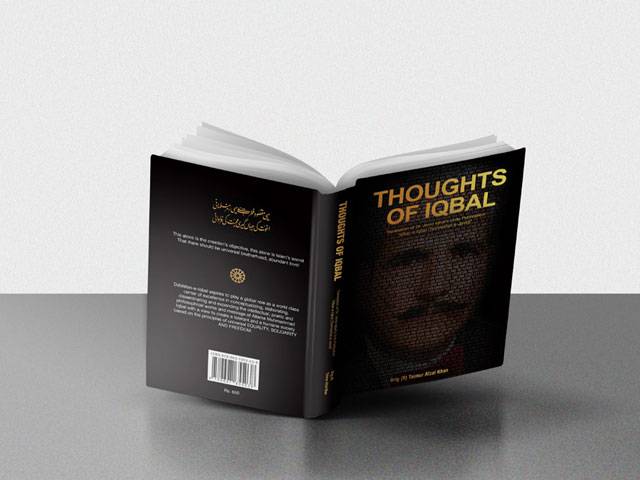LAHORE-Despite the plethora of works on ‘Thought of Iqbal’, this very term thought of Iqbal does not sound redundant or trite. The singular, plausible reason can be the immensity, range and magnitude of Iqbal’s ideas and thoughts which in its fullness and complexity requires more interpretive efforts.
So a flow of even another few thousands of publications in a couple of decades would be rather scarce for the explication of Iqbal’s intellectual repository.
Afkar- e - Iqbal by Late Justice Javed Iqbal can rightly be compared with Dr Rafi Uddin’s Hikmet - e - Iqbal.
Though there are several differences between the two. Both the books treat Khudi as an all-encompassing theme while working upon its innumerable ramifications. Where Hikmet - e - Iqbal is a treatise meant purely for scholars, Afkar- e - Iqbal is immensely useful for laity and general public, though it in no manner deals with the rudiments.
Afkar-e- Iqbal is far less abstruse than its recondite predecessor and thus more intelligible. It is a significant contribution to a society, too, where the declining knowledge of Iqbaliyat demands not only restructuring at a grand scale but also attention from the educated segments of society irrespective of their sociopolitical leanings.
AFKAR KE NAGHMA HAAY BAY SAUT HAIN ZAUQ E AMAL K WASTAY MAUT
As regards the Iqbal studies, however, no serious attention was previously paid on the translation of Iqbalian treatises from Urdu to English and vice versa. This inattention of the past can be remedied now by translating the works of each language into the other, thus enriching both. How pitiable it sounds that a youngster born and educated in an alien land, thus unaware of Urdu or Persian, remains uninformed of the contents of such magnum opuses as “ROOH E IQBAL”, “IQBAL NAI TASHKEEL” and so on.
The translations even if done in the past were scarce and infrequent. With the initiation of ‘THOUGHT’S OF IQBAL’, one hope there will be a host of translations inundating, at the auspices of DABISTAN E IQBAL. In this context, this work is a valuable contribution.
The foreword sets the very tone of the book wherein the writer contends not to delve into any controversy that is in other words vows keeping his work free from complexity and dispute. This promise is kept throughout the book which comprises seventeen chapters. The initial mention of the thirteen disputatious points which go contrary to the generally accepted Islamic thought was intelligently avoided in the subsequent debate.
KHUDI KO KER BULAND ITNA K HER TAQDEER SE PEHLAY
KHUDA BANDAY SE KHUD POOCHAY BATA TERI RAZA KAYA HAI
After the general demarcation of Khudi or Ego the writer aptly goes ahead towards solidification of individual ego vis-a-vis the collective ego, defining their respective components and proving through instances that both complement each other.
The cognitive aspect of ego is no less important but it cannot be detached from the intuitive one according to Iqbal. The former being deficient in probing into the metaphysical or extrasensory affairs needs guidance from the latter at such crucial junctures. Significance of ego in literary works and shaping of arts seems to be a unique contribution of Iqbal towards craftsmanship and letters both.
He has made literature and religion both subservient to ego and it may result in dishonoring the nations who deny the role of ego and do not it, its due respect. This is followed by some interesting debates as to what ego is in the eyes of eastern and western scholars, its ontological and religious character which encompasses the entire universe or in other words the entire universe is ego’s realm. Stepping ahead some difficult debates have been summed up in quite an intelligible way so that even a novice may comprehend them and these are ego in the spatiotemporal context and the life hereafter.
The last four chapters relate to our present and the future. The future according to Iqbal evolves from present and the past. The best remedy to ensure a bright future is to stop bemoaning present and also stop eulogizing excessively the past unless one derives a genuine, feasible inspiration from it. Mere stare at the bygone days serves no purpose if the present and the impending future have to remain hapless.
The elegant translator of this work in hand, our revered and venerable Taimur, is no less a vanquisher just like his historic namesake. But he’s a vanquisher of an altogether different realm; he is conqueror of our hearts. The Cesarean claim is more apt for him than anyone else as he winsomely comes, he sees and he conquers. Taimur translation of Allama’s verses, in the book, is lucid and unobscured and conveys their essence without damaging the poetic flare and literariness, and carries immeasurable potential to make Allama’s message available to general public.






